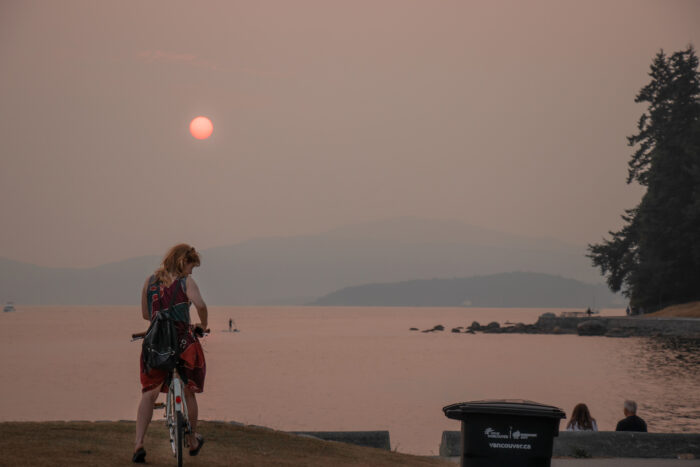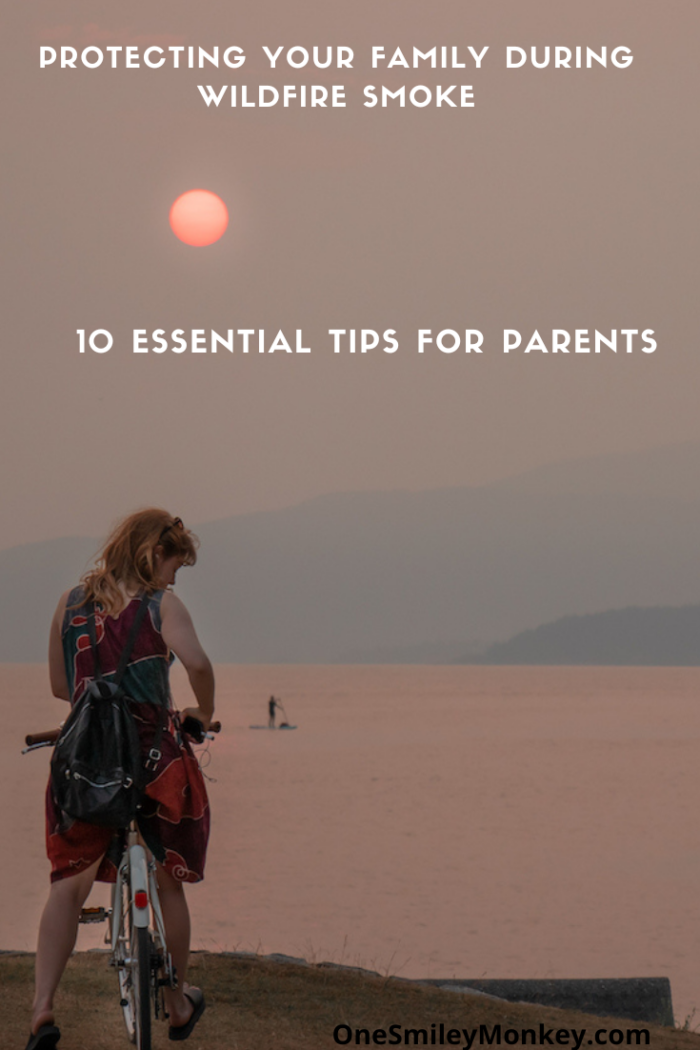As wildfires continue ravaging vast areas in Canada, the resulting smoke has become a growing concern for families in Canada and the US. Poor air quality can pose severe health risks, particularly for vulnerable individuals.
In this blog post, I am sharing some tips to help you navigate through these periods of bad air quality caused by wildfire smoke.
I hope these ideas will help you protect yourself and your loved ones during these challenging times.

Protecting Your Family During Wildfire Smoke: Essential Tips for Parents
- Stay Informed: Stay updated about your area’s air quality conditions. Utilize reliable sources such as the US Environmental Protection Agency (EPA), Canada Environmental and Natural Resources, or local air quality monitoring websites. Monitoring the air quality index (AQI) can help you make informed decisions regarding outdoor activities and necessary precautions.
- Limit Outdoor Exposure: During periods of poor air quality, it is crucial to reduce your time spent outdoors, especially during peak smoke hours. Limiting exposure to smoke is essential to minimize the risk of respiratory issues and other health complications. Stay indoors as much as possible, and keep little ones inside as much as possible; avoid strenuous physical activities that can increase your breathing rate.
- Create a Clean Indoor Environment: Make your indoor space a refuge from the smoky air outside. Keep windows and doors closed to prevent smoke infiltration. If you have an air conditioner or HVAC system, ensure the filters are clean and functioning correctly. Consider using high-efficiency particulate air (HEPA) filters or portable air purifiers to improve indoor air quality further.
- Practice Proper Ventilation: Although keeping windows closed is recommended, it is essential to maintain good ventilation within your home. Run exhaust fans or use portable fans to circulate air and remove pollutants. However, ensure that these fans do not bring in outside air if the air quality is poor.
- Use N95 Masks or Respirators: When air quality is terrible and outdoor exposure becomes necessary, wearing N95 masks or respirators can protect against smoke particles. Ensure that the masks fit snugly and cover both your mouth and nose.
- Stay Hydrated: Smoke-filled air can cause dryness and irritation in the respiratory system. Drink plenty of water to keep your airways moist and to help your body flush out toxins. Avoid excessive caffeine or alcohol consumption, which can further dehydrate your body. Ensure your little ones drink plenty of water throughout the day to stay hydrated.
- Seek Clean Air Shelters: If your home does not have adequate air filtration or if you live in an area heavily impacted by smoke, consider seeking clean air shelters. These include public buildings such as libraries, shopping malls, or community centers with air conditioning and filtration systems.
- Protect the Most Vulnerable: Take special care of children, elderly individuals, and those with pre-existing respiratory conditions. They are more susceptible to the effects of poor air quality. Consider providing them extra protection, such as masks and cleaning their indoor environments.
- Practice Proper Smoke Cleanup: Once the air quality improves, cleaning up any residual smoke particles that may have settled in your home is essential. Wipe down surfaces, launder clothing and bedding, and vacuum using a HEPA filter to remove any remaining smoke residue.
- Seek Support from Your Community: Reach out to your local community for support and information-sharing. Join online parenting groups or forums where families in similar situations can exchange tips, experiences, and resources. Together, we can navigate the challenges of poor air quality caused by wildfires.
Feel free to share your tips in the comments below as well.
Stay safe, everyone xo










6 Comments on “Protecting Your Family During Wildfire Smoke: Essential Tips for Parents”
Thank you for all these great pointers and tips. crazy what is going on right now
The smoke is very hard on everyone Thank you for these important tips
Thank you for sharing these tips…so needed right now!
Thank you for sharing this helpful information. Today the smoke here is finally beginning to clear a little. It had been terrible the last few days.
Very helpful tips. Thanks for sharing
Hopefully next summer there are less forest fires and smoke and we can spend more time outside during our short summers